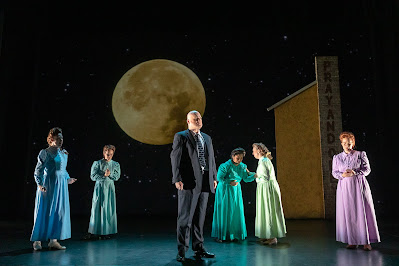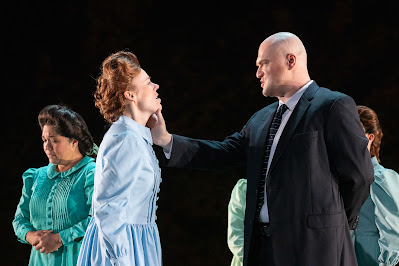
Photo credit: Owen Carey / courtesy of OrpheusPDX
By Mark Mandel
PORTLAND’S CHAMBER OPERA company, OrpheusPDX, completed its second season August 27 by making a powerful case for composer Nico Muhly and librettist Stephen Karam’s 2011 work, Dark Sisters. It spotlights the women of a polygamous, renegade Mormon sect whose children have been taken from them by a U.S. government suspecting abuse and forced marriage.
Based largely on memoirs
and the aftermath of the 2008 raid at Yearning for Zion Ranch, a Fundamentalist
Church of Jesus Christ of Latter-Day Saints community in Texas, Dark
Sisters received a southern Utah setting from director Kristine
McIntyre and designers Megan Wilkerson (sets), Lucy Wells (costumes) and
Solomon Weisbard (lighting). The first scene depicted five sister wives
lamenting their absent children before an orange and white mesa at twilight.
Night skies held a large moon or were star-studded. Daytime video footage of
beautiful landscapes appeared when they would not distract. The ranch
gate bore the inscription “Pray and Obey,” a mantra the women sing almost as
often as “Keep Sweet.” Moving indoors brought formal portraits of Joseph
Smith, Brigham Young and other church-recognized “prophets.”
 |
| Photo credit: Owen Carey / courtesy of OrpheusPDX |
Most of that aptly matched Muhly’s music, which includes Aaron Copland-like open harmonies that evoke vast vistas, plus actual Mormon hymns, and the post-minimalism of John Adams, who also chose a striking Southwest setting (Doctor Atomic), as did Olivier Messiaen (Des Canyons aux Étoiles). The thirteen-musician orchestra that sometimes sounds like more suggests Benjamin Britten’s three chamber operas. Most beautiful, from opening lament to relatively opulent Act I finale, are the passages for a small chorus of women infused by Muhly’s love of Renaissance choral music.
Show, don’t tell, they say. Karam’s skillful libretto eschews narration for conversation that enables the viewer to piece together the story. With McIntyre’s sensitive direction and fine acting throughout the cast, one knew where each of the five wives stood in the eyes of their husband, the Prophet. In this no-narrative vein, OrpheusPDX offered no detailed synopsis of Dark Sisters, which enabled a wrenching surprise: Act II opens with the women in their plain dresses thrust before cameras and a national TV audience for CNN’s “Larry King Live.”
 |
| Photo credit: Owen Carey / courtesy of OrpheusPDX |
Amusing in speaking the role of King, Nathan Stark was scarcely recognizable as the bass-baritone who was so forceful and frightening in singing the Prophet. The power of his position and his voice pointedly accented the heroism of the central character, Eliza, who bravely stands up to him, refuses to be brainwashed, and escapes the cult. Lyric soprano Lindsay Ohse sang a lovely, highly sympathetic Eliza, saying and doing what Everywoman hopes she would in her shoes. A dress-to-pants change for Eliza’s revisit as a civilian made her look still smarter, but she sadly fails to rescue her fifteen-year-old daughter Lucinda, forced to marry a man four times her age. Light lyric soprano Madeline Ross, expert at portraying girls, sang Lucinda’s simple hymns as if the teen were caught in perpetual childhood.
Of Eliza’s four fellow sister wives, mezzo-soprano Hannah Penn, as ever a riveting vocal and physical actress, sang wide intervals and broken lines as deeply troubled, suicidal Ruth. At the opposite pole, spinto soprano Vanessa Isiguen, renowned in Puccini, poured out rich tone as Almera, the confident true believer. Mezzo Sarah Beaty’s Presendia longed keenly for the Prophet’s attentions. With less sheer voice than those three, light lyric soprano Emily Way was perfectly persuasive as obedient, a bit bossy, make-no-waves Zina.
Deanna Tham, associate conductor of the Oregon Symphony, led a fine orchestra with authority and clarity. The woodwind playing stood out as especially eloquent.
 |
| Photo credit: Owen Carey / courtesy of OrpheusPDX |
No comments:
Post a Comment